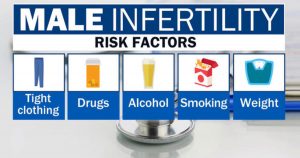#ThursdayThoughts
As promised, each Thursday, we will now offer you a piece of educational, science, or research related information. The purpose of our #ThursdayThoughts post is to share with you fact-based content that can enlighten and assist you on your fertility journey. Enjoy our post! Helping to Create New Beginnings….
Impact of Lifestyle and the Environment on Male Factor Infertility
Male factor infertility plays a role in a couple’s ability to conceive > 40% of the time. Several factors can affect sperm quality including medical, environmental, and lifestyle issues. Medical factors such as varicocele (dilated veins in the testicle), and some infections, can interfere with sperm production and passage of sperm. Some prescribed medications can negatively affect sperm quality. These include testosterone, anabolic steroids, opiates, and certain medications to treat high blood pressure. Medications to treat hair loss such as Propecia or prostate enlargement are other examples. Herbal medication such as St. John’s Wort can also affect quality.
Overheating the testicles is one environmental cause of lower sperm quality. Keeping testicles cooler than the rest of the body is important for proper function; avoiding excessive hot tub use and wearing loose clothing may improve sperm quality. Other environmental causes are exposure to industrial chemicals and heavy metals. Exposure to pesticides can be linked to abnormal semen quality, sterility, and even prostate cancer (ACOG, 2013).
Health and lifestyle factors shown to impact sperm quality include use of tobacco, alcohol, caffeine, recreational drugs, obesity, and stress. Excessive alcohol consumption may lead to further decrease of sperm count (Int J Fertil 40 (3): 135-138, 1995). The degree of smoking and alcohol use does not seem to alter semen analysis parameters, however there can be a significant reduction in semen volume, sperm concentration, and the percentage of motile sperm in men who use alcohol or smoke cigarettes. A study by Fertility Institute of Hawaii’s Dr. Karmon included 171 men who drank on average >1.4 US standard drinks per day. This study demonstrated that moderate drinking does not appear to affect semen quality and pregnancy outcomes. However, alcoholism and heavy drinking have shown negative effects. Men who consumed >272mg of caffeine per day demonstrated lower pregnancy rates.
Obesity has also been linked to male factor infertility. Obese men have decreased testicular function and increased production of female hormones which in turn can lower sperm count. Stress can also decrease sperm concentration and increase the amount of abnormal sperm. Getting enough sleep, regular exercise, and eating healthy can help combat stress and obesity, and in turn may improve overall sperm quality. For more information on male factor infertility, please visit our website at https://www.ivfcenterhawaii.com/ or schedule a consultation with one of our physicians.
